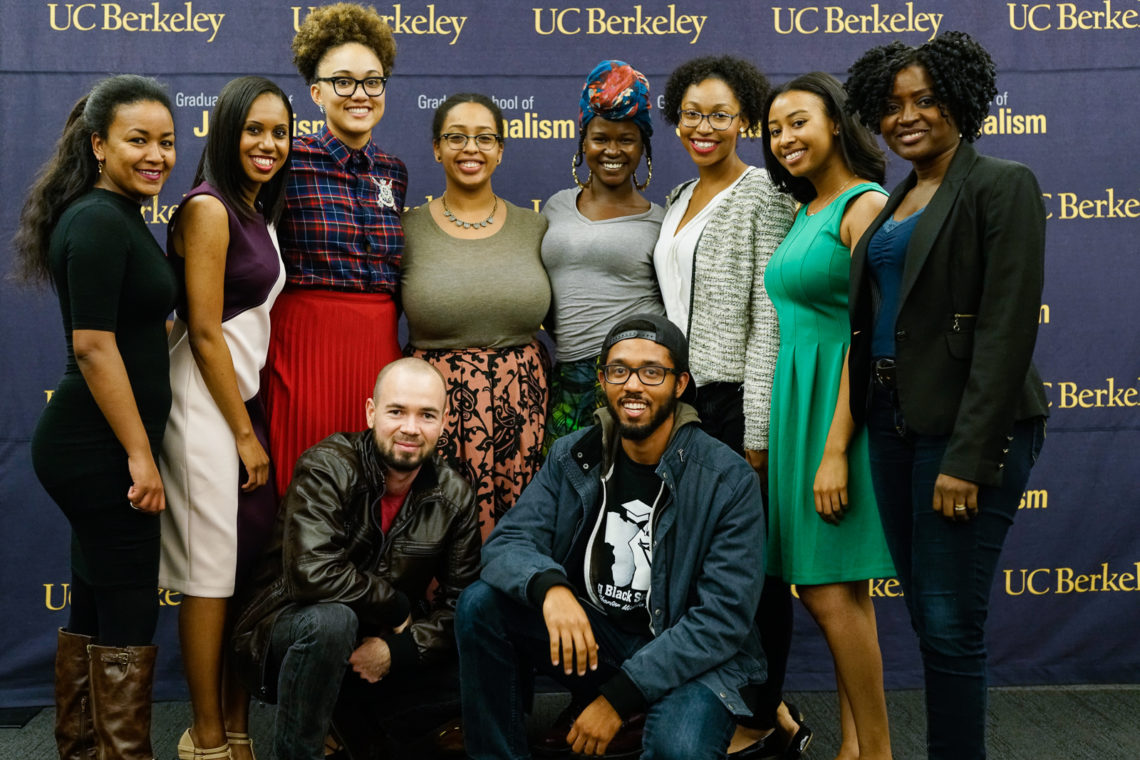
Back row (from left to right): Nebiat Assefa Melles (’18), Rachel Loyd (’18), Ryan Lindsay Arrendell (’18), Lee Mengistu (’19), Abené Clayton (’19), Jailyn Anderson (’19), Alexandria Fuller (’18), Grace Oyenubi (’18). Photo: Yesica Prado (’18).
The current political climate has presented a new set of ethical and philosophical challenges for many reporters. But it was only the first week of J-School orientation when Abené Clayton (’19) says she realized that as a black reporter, the dilemmas she would face in her career went well beyond what her non-black peers might. That first week of school, the Class of 2019 broke into small groups to discuss covering white privilege, and one classmate remarked that they would try to feign neutrality if they ever covered the subject.
“My counter to that was, ‘That sounds really great, but my opinion is on my face because I’m a whole black person,’” Clayton said.
That realization sparked an idea she brought with her to the next meeting of UC Berkeley’s chapter of the National Association of Black Journalists: How do black reporters deal with the journalistic standard of integrity when they’re facing a subject that denies their personhood?
Weeks later, NABJ continued that conversation with the help of four professionals: Millie Jefferson, a senior producer of Audible’s original content; Marcus Thompson, a Bay Area sports columnist at The Athletic and author of “Golden: the Miraculous Rise of Steph Curry;” Dawn Porter, director and founder of Trilogy Films, and Otis Taylor, the San Francisco Chronicle’s East Bay columnist. The panel, titled Objectivity Through the Black Lens, gave students the opportunity to hear from black journalists about how they’ve faced this issue.
White supremacy was also discussed, not just as a topic for reporting, but as an issue the panelists have encountered themselves. Jefferson described a moment when a higher-up in a company praised an audio piece she produced, only to refuse to shake her hand when he saw that she was black. Porter, an Oscar-nominated documentary filmmaker, started her own production company to escape the bias and discrimination she faced trying to get jobs and funding in the documentary film industry as a black woman.
Panelists’ experiences ranged from racism as overt as the man who refused to shake Jefferson’s hand, to more subtle micro-aggressions, as when Taylor read about a murder victim in his own paper only to find that the article made a point of mentioning that he had no gang affiliation or criminal history — something he couldn’t see them doing if the victim was white. Or Thompson adding he felt tokenized by constantly being asked to weigh in on the “take a knee” debate.
“I think we all take in the microaggressions,” Porter said. “We stop counting them because otherwise we would go crazy.”
Alexandria Fuller (’18) and Rachel Loyd (’18), NABJ co-presidents, facilitated the panel. Fuller, a new media student, was recently awarded NABJ’s Acel Moore Scholarship for Community Journalism. Loyd, who’s studying longform video, is already working as a weekend assignment editor at KRON in San Francisco. Their questions touched on the range of recent racially fraught events from the demonstrations in Charlottesville and Berkeley to the criticism of black female reporters’ appearances.
“It’s a very unique time for journalism right now, period, regardless of your identity,” Loyd said prior to the event. “But I think that it’s even more challenging now as a black reporter.”
Even though black journalists on the panel and in the audience were connecting over shared perspectives, part of what the panel accomplished was representing the diversity of experience among black reporters.
While Thompson, as an NBA reporter, spent less time in non-black spaces, Taylor and others in newsrooms often found that they were the only black people in their workplace. They often faced pressure to cover anything remotely black-related, or speak for the “black community” as if it were somehow a homogenous whole.
“The world isn’t black and white,” Fuller said before the event. “There’s not just one perspective for each individual story. We all come from different backgrounds, different communities.”
Alex Matthews (‘19)
